In March 2020 the process of digitalisation amongst Banks, Fintech StartUps and all sorts of companies across the world escalated. As some commentators call it: digitalisation on steroids. Once the dust settled a little, it became apparent that Digital Fintech Careers will be one of the continued growth sectors Post-Covid.
In December we spoke to BNY Mellon about how they had moved over 50,000 employees from an office environment to fully remote within 3 weeks. They were not the only company to face this challenge:
. One very noticeable trend is the focus on the organizational culture, which puts human capital at its core.
"I’m an engineer, so the job is never done. As an engineer, there’s no working system that can’t be made better. People say if it’s not broken, don’t fix it. No, it’s not broken, but let’s make it better." Hans Brown of BNY Mellon shared https://t.co/MfER4fHHvS
— #DisruptionBanking (@DisruptionBank) December 10, 2020
And one of the big takeaways from the experiences that BNY Mellon shared with us, was how important organizational culture is and must remain. Covid has made looking after any workforce more complex, and business leaders have had to step up to ensure they stay relevant and provide the right leadership.
With words like Digital Workforce, Digital Native and Generation Zoom being used more regularly than ever, it is vital for businesses to stay ahead when it comes to Digital. Business need to help their employees make a practical and effective use of technologies, and help them understand how technologies can affect them.
Innovations in working with people and online training have helped us overcome the challenges, but new challenges have also arisen with so many people working from home. Onboarding virtually and online performance management issues are just some of the new problems that human resources teams are being faced with.
Recruitment Re-shaped
Inevitably, the post-pandemic future of recruiting will have to be reshaped. A LinkedIn survey among users and related interviews with talent leaders concluded predictions of what the future of recruiting might look like.
Since the start of COVID, there has been a 13% increase in internal mobility year on year. Recruiters will be prioritizing applicants who possess transferable skills like adaptability and problem-solving, over experience and technical capacity to do tasks.
In addition, 76% of talent professionals across EMEA shared that diversity will be crucial, and 79% believe remote working will be here to stay.
Danske bank is one of the many organizations that will be offering their staff the option of working from home a couple of days a week post COVID-19 and will be investing in digital collaboration tools and platforms to create a more attractive and flexible workplace.
The Dutch bank, ABN AMRO, utilized their survey and communication IT tool, normally used amongst users on technical issues, to reach out directly to their employees. The bank wanted to find out how their teams were doing emotionally and technologically during the crisis and to offer them support.
In a Gartner HR research paper, the top 2021 priority among HR leaders is building critical skills and competencies (68%). Employees are expected to have a broader skill set for every job – the total skills required for a single job will increase by 10% year over year – and many of those skills are new.
33% of the skills that were present in an average job posting in 2017 won’t be needed by 2021.
As it becomes apparent, in these unpredictable times, the only constant is change, organizations need to provide their employees with the right skills and knowledge to innovate from within.
Employees of financial institutions are a great source of innovation. They have insights on internal requirements and challenges which C-level executives do not necessarily see.
Digital Fintech Careers
FinTechs have long focused on building products that will fit multiple clients, most of these solutions don’t fit each customer perfectly. With globalization, teams are engaging with larger amounts of markets which differ in mentality and technological level.
Dear FinTechers!
— FinTech-Aviv (@FinTechAviv) January 20, 2021
If you're looking for your next FinTech position, make sure to join us on next Wednesday!
Don't miss the opportunity to meet experts and explore open positions from leading FinTechs, register here – https://t.co/V3oHv7PlfJ #fintech #summit #jobfair pic.twitter.com/7KLWkuz48R
Providing employees with tools to expand their knowledge in various FinTech segments can allow for:
- Cross department collaboration
- New revenue streams and engagements
All of which can reduce costs for financial institutions, especially when teams are allowed to focus on the specific requirements of the financial institution and the actual day to day activities needed.
FinTechs have recognized the added value of a strong team and are also putting a lot of focus on the wellbeing and awareness of their employees.
The fast-growing FinTech Capitolis, which enables financial institutions to optimize their balance sheets, creating a fairer, safer and healthier marketplace, is expanding globally and focused on recruiting exceptional talent to develop their ground-breaking platform.
Another example is Finastra, a global FinTech leader, which provides a range of pre-integrated solutions spanning retail banking, transaction banking, lending, and treasury and capital markets. Finastra has more than 9,000 employees globally, and has put extensive efforts into enriching employee’s knowledge and skills with mandatory internal training programs on a weekly basis.
Other external programs are supporting the nurturing of organisations’ employees.
Equitech have used their vast experience in FinTech, launching a designated Corporate FinTech Academy Program.
The program supports the understanding of new processes that the company is undertaking. Enriching mid-level executives with wide FinTech knowledge and cross departmental connectivity.
As a result, it will contribute to the success of integrating future FinTech solutions, improve their sense of engagement, and equip them with tools to take a more active part in the organisation’s FinTech transformation process.
It is companies that have embraced the Post-Covid reality. Companies that have showed their teams that they appreciate and cherish them for their expertise and dedication, who will prevail in the long run and be able to create a holistic innovation process combining technology and human capital.
FinTech-Aviv – The Israeli FinTech Association is hosting a digital job fair on January 27th, 2021 @ 5 pm IDT.
Supporting the recovery of the Fintech industry the event will help with:
- Engaging with job seekers
- Will give exposure to corporates
- Help HR understand the market and challenges better
- Offer personalized digital booths
- and much more…
Another company attending the Fair will be Personetics, whom we interviewed in 2020. To find out more about a leader in Fintech in Israel, have a look at the video with Dorel Blitz:
Some of the other companies participating will be: Zooz, Finastra, Qapital, Capitolis, Applause, MAX, Jifiti, ThetaRay, Solitics and many more..
#DigitalFintechCareers #FintechAviv #PostCovid #DigitalTransformation #WorkfromHome #JobFair #RemoteWork
Register to the event: https://www.fintech-aviv.com/Jan27
Upload your CV or open position: https://www.fintech-aviv.com/fintech-careers
Authors: Tal Sharon and Andy Samu


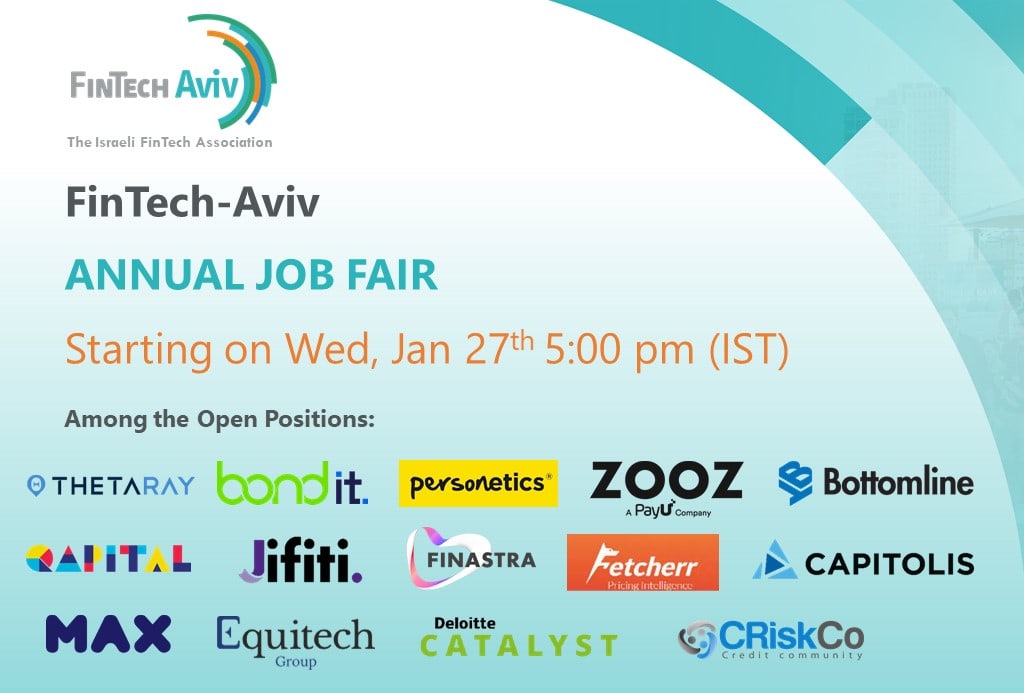

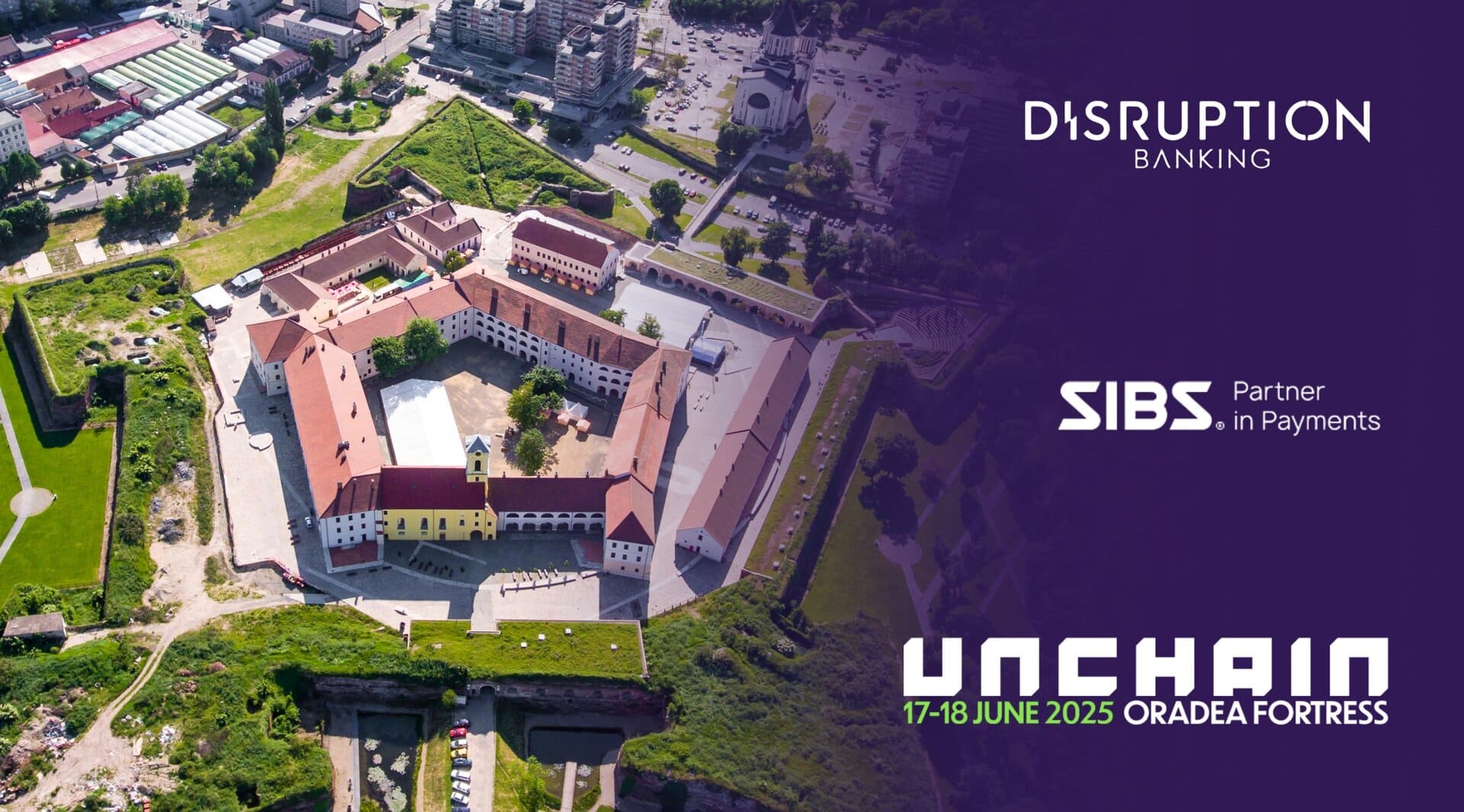
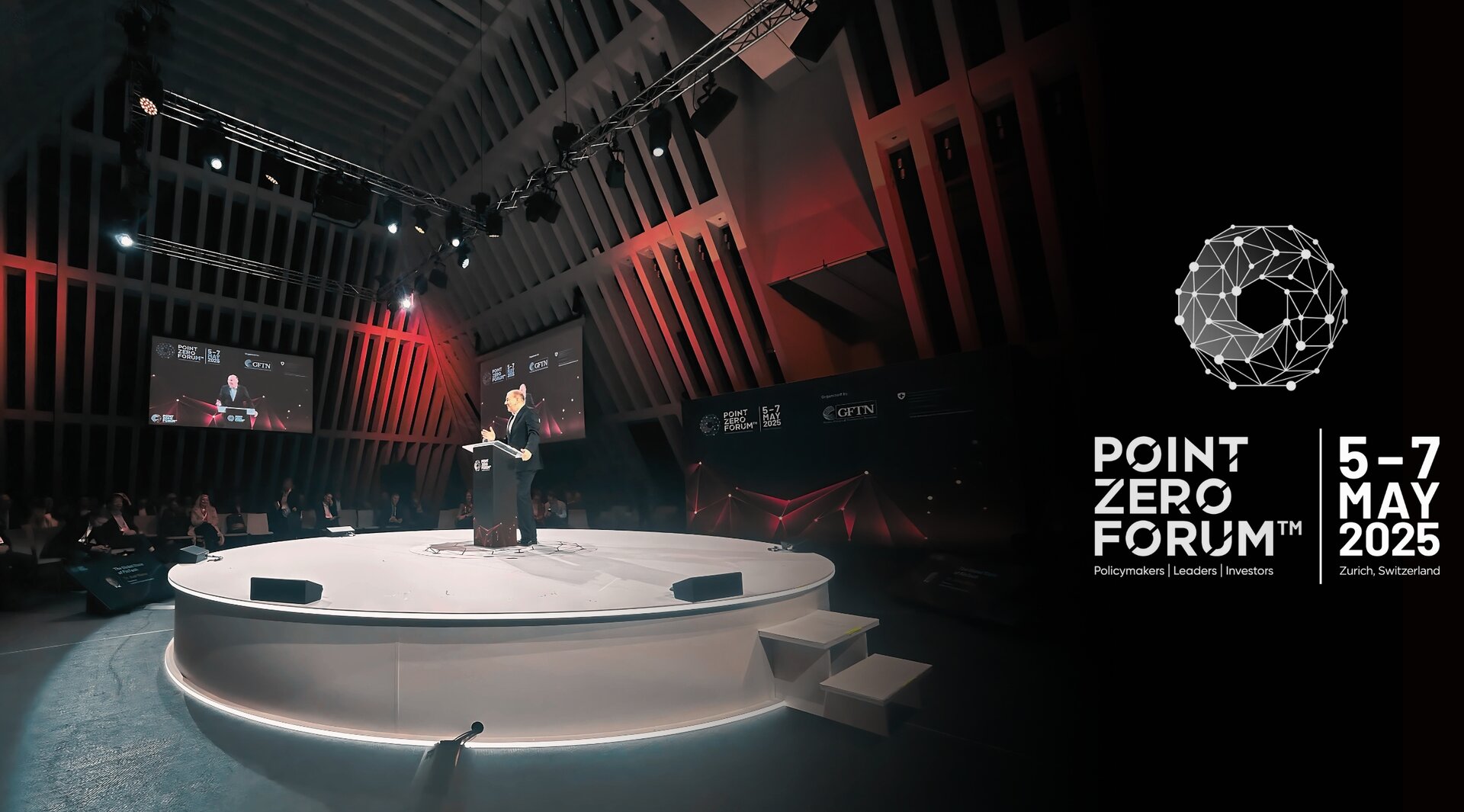






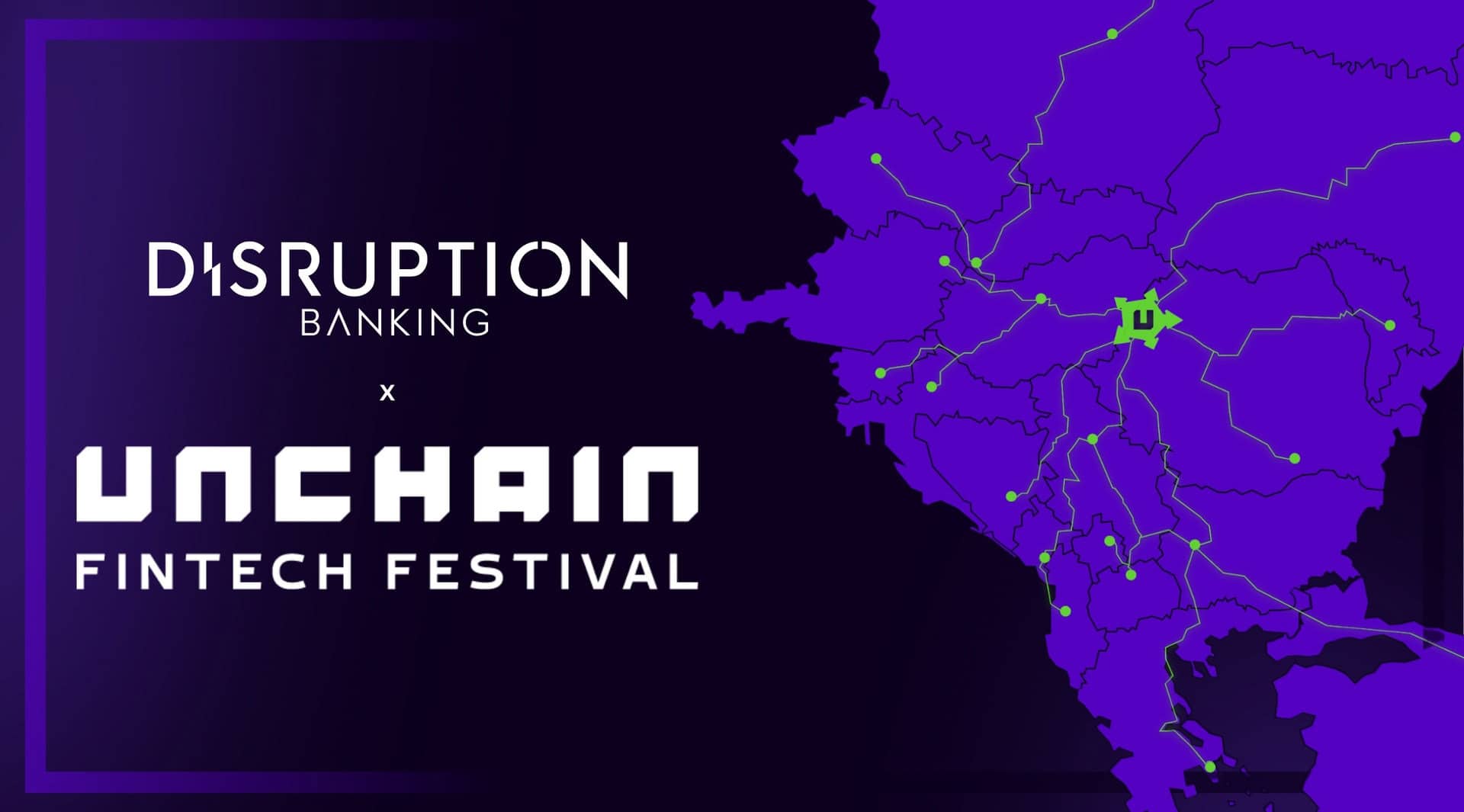

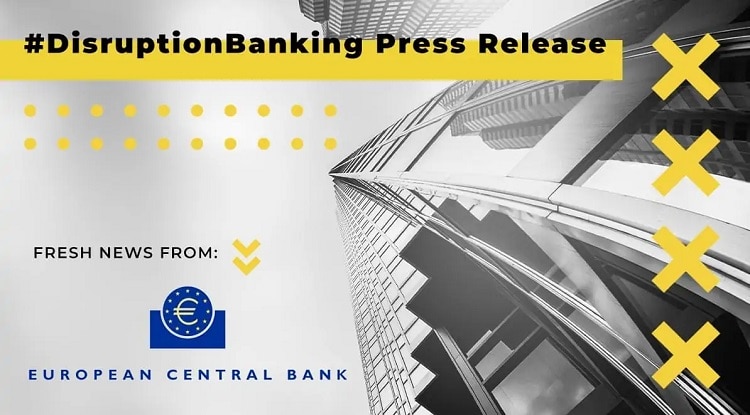

One Response